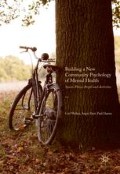Abstract
In a lovely article on many of the inherent contradictions of being a clinical psychologist, David Smail (1) said that ‘we cannot escape the clinic’. When it comes to helping people experiencing mental distress, it would be a callous society that stood back and offered them nothing on the presumption that, as Charles Waldegrave points out, therapy is little more than making poor people feel a bit better about themselves (2). Perhaps the problem however is not with therapy per se but with what therapy has become. The therapeutic relationship, when understood as an instance of ordinary humanity and as a source of solidarity can be eminently valuable. When it is treated as a technology of change with a progressive emphasis on what’s inside people’s heads, and that culminates in people becoming patients schooled to bear responsibility for circumstances beyond their control, then it loses its value (1). If we pare back the therapeutic process to understand Roger’s unconditional positive regard and empathy not as tools to achieve change but as an end in and of themselves, and where compassion rather than change becomes the overriding impulse, it allows us to see just how many other sites of social solidarity, compassion and humanity can be understood within this broader care framework. This is because empathy, support, positive regard and compassion can be delivered in most places, by most people.
Access this chapter
Tax calculation will be finalised at checkout
Purchases are for personal use only
References
Smail, D. J. (2005). Power, interest and psychology: Elements of a social materialist understanding of distress. London: PCCS Books.
Waldegrave, C. (2005). “Just therapy” with families on low incomes. Child Welfare, 84(2), 265–276.
Sieberg, C. B., Williams, S., & Simons, L. E. (2011). Do parent protective responses mediate the relation between parent distress and child functional disability among children with chronic pain? Journal of Pediatric Psychology, 36(9), 1043–1051.
Emerson, E. (2003). Mothers of children and adolescents with intellectual disability: Social and economic situation, mental health status, and the self-assessed social and psychological impact of the child’s difficulties. Journal of Intellectual Disability Research, 47(4-5), 385–399.
Emerson, E., Shahtahmasebi, S., Lancaster, G., & Berridge, D. (2010). Poverty transitions among families supporting a child with intellectual disability. Journal of Intellectual and Developmental Disability, 35(4), 224–234.
Reid, D. K., & Valle, J. W. (2004). The discursive practice of learning disability implications for instruction and parent—School relations. Journal of Learning Disabilities, 37(6), 466–481.
Walker, C., & Streatfield, J. (2012). The Amaze disability living allowance project: An evaluation. Brighton: University of Brighton.
Cromby, J., Diamond, B., Kelly, P., Moloney, P., Priest, P., Smail, D., et al. (2012). Draft manifesto for a social materialist psychology of distress. Journal of Critical Psychology, Counselling and Psychotherapy, 12(2), 93–107.
Tew, J. (2011). Social approaches to mental distress. Basingstoke: Palgrave Macmillan.
Banks, P., & Lawrence, M. (2005). Transparent or opaque? Disabled people in Scotland describe their experience of applying for disability living allowance. Journal of Social Work, 5(3), 299–317.
Tam, S.-F., & Cheng, A. W. (2005). Self-concepts of parents with a child of school age with a severe intellectual disability. Journal of Intellectual Disabilities, 9(3), 253–268.
Manning, N. (2010). Therapeutic communities: A problem or a solution for psychiatry? A sociological view. British Journal of Psychotherapy, 26(4), 434–443.
Duff, C. (2012). Exploring the role of ‘enabling places’ in promoting recovery from mental illness: A qualitative test of a relational model. Health & Place, 18(6), 1388–1395.
Grant, A. (2015). Demedicalising misery: Welcoming the human paradigm in mental health nurse education. Nurse Education Today, 35(9), e50–e53.
Mol, A., Moser, I., & Pols, J. (2010). Care: Putting practice into theory. In A. Mol, I. Moser, & J. Pols (Eds.), Care in practice: On tinkering in clinics, homes and farms (pp. 7–26). Bielefeld: Verlag.
Singleton, V. (2010). Good farming: Control or care? In A. Mol, I. Moser, & J. Pols (Eds.), Care in practice: Tinkering in clinics, homes and farms (pp. 235–256). Bielefeld: Verlag.
Law, J. (2010). Care and killing. In A. Mol, I. Moser, & J. Pols (Eds.), Care in practice: On tinkering in clinics, homes and farms. Bielefeld: Verlag.
Pols, J. (2010). Telecare: What patients care about. In A. Mol, I. Moser, & J. Pols (Eds.), Care in practice: On tinkering in clinics, homes and farms. Bielefeld: Verlag.
Atkinson, S. (2013). Beyond components of wellbeing: The effects of relational and situated assemblage. Topoi, 32(2), 137–144.
Mol, A. (2002). The body multiple: Ontology in medical practice. Durham: Duke University Press.
Author information
Authors and Affiliations
Copyright information
© 2017 The Author(s)
About this chapter
Cite this chapter
Walker, C., Hart, A., Hanna, P. (2017). ‘Helping Them Hold Up Their World’—Parents of Children with Complex Needs and the Beneficent Organisation. In: Building a New Community Psychology of Mental Health. Palgrave Macmillan, London. https://doi.org/10.1057/978-1-137-36099-1_6
Download citation
DOI: https://doi.org/10.1057/978-1-137-36099-1_6
Published:
Publisher Name: Palgrave Macmillan, London
Print ISBN: 978-1-137-36098-4
Online ISBN: 978-1-137-36099-1
eBook Packages: Behavioral Science and PsychologyBehavioral Science and Psychology (R0)

